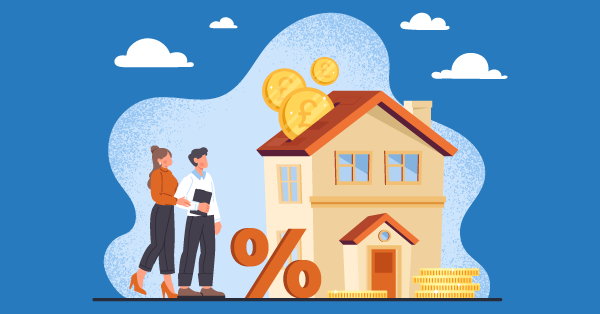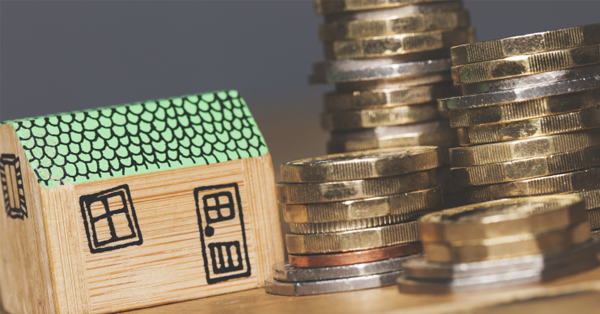Split Up With Partner, Am I Entitled to the Property?
- As a beneficial owner you could be due a share of the property so don’t be fooled into thinking that if your name’s not on the title deeds, you’re not owed anything.
- In cases where you are living in the property as joint tenants under a tenancy agreement, your financial contributions might also be considered in the context of the tenancy agreement.
- Top Tip: If you are paying money towards a property, always document it through a cohabitation agreement.
When a relationship breaks down, it's a difficult situation that can be worsened if there is a dispute with your ex-partner about whether you are due money from the property you’ve lived in together.
If you're both named on the title deeds
When both partners are named on the title deeds, the property is typically considered a joint asset. In the UK, this means you both have equal rights to the property, regardless of who contributed more financially. This type of ownership can be set up as either joint tenants or tenants in common.
Many joint owners don't put anything in writing and base their joint tenancy agreement or ownership agreement on assumptions and trust, exposing themselves to disputes.
You could be due £1,000s from the sale of the property you shared with your ex-partner. If you were married or in a civil partnership, consulting a family law team can help you understand your rights and potentially take legal action to ensure fair asset division.
Are you due money from the property?
Many think that because they aren't registered as the legal owner of the property they aren’t due any share of it. You may still be entitled to a share of the property if you’re not a registered legal owner; because you could be an unregistered beneficial owner, without even knowing it.
This article will examine 3 scenarios and specific circumstances where you may own a share of the property even though you aren’t a registered owner of the property, including situations involving a civil partnership and marriage, and the legal rights and responsibilities that come with it.

As joint tenants, you both own the property equally. If one of you dies, the other automatically inherits the entire property. However, neither of you can sell or mortgage the property without the other's consent.
As tenants in common, you each own a specific share of the property, which can be unequal. For example, one partner might own 60%, and the other 40%. If one partner dies, their share doesn't automatically go to the other but can be passed on according to their will. This setup is often used when partners have contributed different amounts to the property purchase.
If you aren't named on the title deeds
If you’re not named on the title deeds, your rights to the property can be more complicated. Generally, the partner whose name is on the deeds is considered the legal owner. However, the non-owning partner may still have a beneficial interest if they can prove they've contributed financially to the property, such as paying towards the mortgage or home improvements.
Proving beneficial interest
To claim beneficial interest, you'll need to provide evidence of your contributions. This could include bank statements, receipts for home improvements, or proof of regular payments towards household expenses. If you can establish this, you may be entitled to a share of the property’s value, even if your name isn’t on the title deeds.
Rights to the property if you're married with kids
If you're married and have children, the courts place a strong emphasis on the welfare of the children when deciding property rights. The priority is usually to ensure that the children have a stable home.
In the UK, both spouses have "home rights" to live in the matrimonial home, even if only one name is on the title deeds. These rights continue until a divorce settlement is reached. Courts often favour arrangements that allow the primary caregiver to remain in the home with the children, at least until they reach adulthood or a financial agreement is made.
We can help with:
- Discussing the benefits of a prenuptial agreement versus various alternatives.
- Drafting a fair agreement to meet the criteria to be upheld in court.
- Negotiating terms between partners.
- Providing independent legal advice on the terms of an agreement drafted by another solicitor.
- All of the above for a post-nuptial agreement, if you are already married or civil partners.
- Property disputes and litigation if your relationship has broken down, with or without a pre-existing prenup.

What happens if you can't agree on what happens to your home?
- Mediation involves a neutral third party who helps both partners discuss and negotiate a fair agreement. It’s a cost-effective and less hostile approach compared to court proceedings.
- If mediation fails, you may need to seek a court order to resolve the dispute. The court will consider various factors, including the financial contributions of each partner, the welfare of any children involved, and any other relevant circumstances. The court’s decision can result in one partner buying out the other, selling the property and splitting the proceeds, or allowing one partner to stay in the property for a set period.
- It’s crucial to seek legal advice if you can’t agree on property matters. A solicitor can guide you through the process, help protect your rights, and ensure you reach a fair resolution.
Are you splitting up with your partner?
We can help you get your share of the property. Call our joint ownership dispute specialists on 0333 344 3234 or find out more below.
Example 1: Contribution towards the purchase
The first thing to consider when defining property ownership after a breakup is what you contributed towards purchasing the property. This does not include costs such as solicitor fees, broker charges, and surveys, but rather the actual purchase price.
Typically, your share is calculated by dividing your contribution to the purchase price by the total sum contributed, including any funds from a joint account.
In the court case of Tinsley v Milligan, a couple bought a house in Tinsley's name for £29,000. Tinsley obtained a mortgage for £24,000 in their name, and the remaining £5,000 was obtained from the sale of a car they jointly owned. Since the £5,000 came from both Tinsley and Milligan in equal parts, the judge ruled that Milligan owned half of the property.
If you have paid a portion of the purchase price and haven't agreed to anything else (like a gift or a declaration of trust), then you own a share of the property. This is regardless of whether you are registered with the Land Registry as a legal owner or not.
Does this apply to you? Are you due money from the property? Are you being told you are due nothing? Call our joint ownership specialists and let us help you - 0333 344 3234

Example 2: Contribution to mortgage payments
The way you view your contribution towards the mortgage depends on whether you had an agreement to pay the joint mortgage when buying the property, or if you are stepping in at a later date to support mortgage payments.
In situations where you and another person are living together in a property as joint tenants under a tenancy agreement, your financial contributions may be taken into account, particularly if you are involved in updating the names on the tenancy agreement or attempting to get a new tenancy agreement in your name.
Agreement with an ex-partner when the property was purchased
If you and your partner agreed to contribute to the mortgage payments when you bought the property jointly, and you promptly made the payments in full while keeping records of them, this would give you a stronger claim for a share of ownership if you end up separating from your partner and have to go to court.
This is particularly important for unmarried couples and those in a civil partnership, as legal rights and protections can vary significantly.
A real-life example of this was in the court case Cowcher v Cowcher where a house was purchased for £24,000. Cowcher A provided £8,000 of their own money and the remaining £16,000 was funded by a mortgage taken out in the name of Cowcher B.
The Judge ruled that Cowcher A contributed £8,000, plus half the mortgage of £16,000 (£8,000), meaning that Cowcher A owned £16,000 of the £24,000 - two-thirds of the property.
Contribution towards mortgage repayments after purchase
This situation is harder to prove, but it is the category into which most people will fall. Consider this scenario: a boyfriend purchases a property, and later on, his girlfriend moves in. They both agree to share the mortgage repayments with a verbal agreement. However, after 2 years, they break up and she moves out.
The girlfriend does not have a clear ownership right because she did not have an agreement with the mortgage lender or a written agreement with the boyfriend to pay the mortgage at the time he purchased the property. However, this does not mean that she does not own a share of the property.
The girlfriend may argue that she had an implied common intention to share the ownership of the property. If she can demonstrate this intention, she could be entitled to a share of the property through a beneficial interest. The financial interest she could be entitled to might be more than the exact mathematical equivalent of her contributions.
It is also important to consider parental responsibility when discussing financial support for children, as this can impact the financial arrangements regardless of the living situation.
TIP:
The best way to demonstrate that you had a common intention to share the ownership of the property and directly contribute towards mortgage repayments is to:
- Show evidence of the payments made listed in a document.
- Provide copies of your bank statement showing payments.
- Any documented evidence stating that this was the arrangement from the point when you moved in together.

Example 3: Contribution to the cost of repairs or renovation
If you contributed financially towards repairs or renovation to the property and the property increased in value, then you could be entitled to a share of any increase in the property's value.
As an example, let us assume Jane and Jim live in a home worth £100,000 that Jim was the only registered owner of. They agree to build an extension which increases the property's value to £150,000, however, Jim has no money to pay for the extension so Jane pays the £30,000 it costs to complete the extension.
In this example, Jane would own a beneficial interest in the property to the value of £50,000 which is the difference between the property's price without the improvements and with the improvements.
NOTE:
Repairs and renovations such as painting, new carpets, curtains, or even a new kitchen would not count. Think more along the lines of extensions and conversions.
Was it a gift?
There may be situations where the money you contributed towards mortgage payments was a gift. If one partner made payments as a gift, these payments do not count towards the claim of ownership.
Think before you pay any money into a property you don't own
Remember: Document any money you put into the property with a cohabitation agreement. Smart couples protect themselves individually and see their payments as an investment in a jointly owned property.
We provide legal agreements for joint owners that clearly state the structure of the legal ownership of the property and cover all 3 of the above examples to protect the interests of both legal owners and beneficial owners.
Our legal agreement is called Shared Ownership Protection and can be created at the point you purchase, or at any time during the ownership of the property.
We also provide support during disputes when your relationship breaks down and you want to establish who owns the property. Our specialists can provide support and legal advice; we have solicitors on hand should you not be able to come to an agreement which satisfies both parties.
For more information, please call us on 0333 344 3234 or read more about shared ownership protection.
Andrew started his career in 2000 working within conveyancing solicitor firms and grew hands-on knowledge of a wide variety of conveyancing challenges and solutions. After helping in excess of 50,000 clients in his career, he uses all this experience within his article writing for SAM, mainstream media and his self published book How to Buy a House Without Killing Anyone.
Caragh is an excellent writer and copy editor of books, news articles and editorials. She has written extensively for SAM for a variety of conveyancing, survey, property law and mortgage-related articles.









